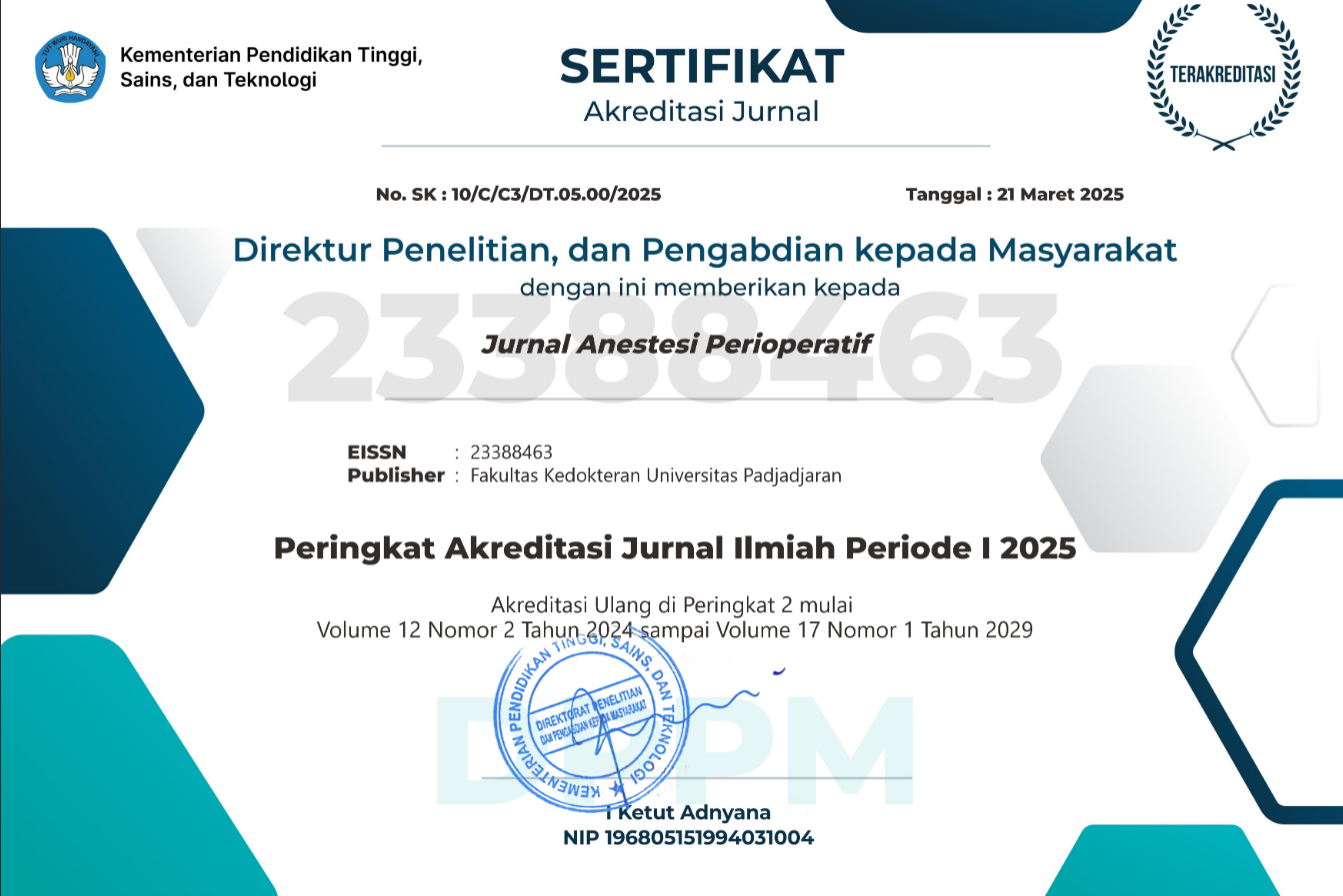Perbandingan Antiseptik Chlorhexidine Alkohol dengan Povidone Iodine terhadap Penurunan Pertumbuhan Koloni Bakteri pada Kateter Epidural yang Dipasang di Kamar Operasi Rumah Sakit Dr. Hasan Sadikin Bandung
Abstract
Chlorhexidine alkohol dan povidone iodine digunakan sebagai zat antiseptik pada anestesi epidural. Aseptik dan antiseptik sebelum tindakan epidural harus dilakukan secara optimal untuk menurunkan komplikasi infeksi pascatindakan. Tujuan penelitian ini menilai perbedaan penurunan pertumbuhan koloni bakteri pada kateter epidural di Rumah Sakit Dr. Hasan Sadikin Bandung. Penelitian single blind randomized controlled trials pada 76 pasien yang dilakukan anestesi epidural di Rumah Sakit Dr. Hasan Sadikin Bandung pada bulan November 2014–Februari 2015. Subjek penelitian dibagi menjadi 2 kelompok, yaitu chlorhexidine alkohol dan povidone iodine. Dilakukan pemeriksaan kultur apus kulit sebelum dan sesudah tindakan aseptik dan antiseptik kemudian dilakukan pemeriksaan kultur kateter epidural pada hari ke-3 setelah pemasangan. Data hasil penelitian dianalisis dengan menggunakan uji-t, chi-kuadrat, dan Uji Mann-Whitney. Hasil penelitian ini didapatkan kultur positif bakteri dari pemeriksaan sebelum tindakan aseptik dan antiseptik 33 dari 38 pada chlorhexidine alkohol dan 35 dari 38 pada povidone iodine. Kultur positif bakteri menjadi 4 dari 38 pada chlorhexidine alkohol dan povidone iodine setelah pemberian aseptik dan antiseptik. Kultur pascapemasangan kateter epidural positif bakteri 7 dari 38 pada chlorhexidine alkohol dan 5 dari 38 pada povidone iodine (p<0,05). Simpulan penelitian ini menunjukkan zat antiseptik chlorhexidine alkohol lebih lebih rendah pertumbuhan kumannya bila dibanding dengan povidone iodine pada kateter epidural.
Kata kunci: Antiseptik, chlorhexidine alkohol, povidone iodine
Comparison between Chlorhexidine-Alcohol and Povidone Iodine in Reducing Catheter Tip Bacterial Colonization in Dr. Hasan Sadikin General Hospital Bandung
Abstract
Chlorhexidine-alcohol and povidone iodine are commonly used as antiseptic solutions in epidural anesthesia. Aseptic and antiseptic procedures must be performed before any epidural procedure to lower infection complications after the procedure. The objective of this study was to investigate the lowest bacterial growth on epidural catheter after chlorhexidine-alcohol or povidone iodine application as the antiseptic solution in Dr. Hasan Sadikin General Hospital Bandung. This was a single blind randomized controlled trial on 78 patients underwent epidural anesthesia in the period of November 2014–February 2015. The subjects were divided in to 2 groups, each consisted of 38 patients. Aseptic and antiseptic procedures were performed using chlorhexidine-alcohol or povidone iodine with skin swab culture collected before and after the procedure. Epidural catheter culture was performed in the 3rd days after the installment. Data were analyzed using t-test, chi-square test, and Mann Whitney test. The result of this study showed positive bacterial cultures prior to aseptic and antiseptics, 33 from 38 in chlorhexidine-alcohol and 35 from 38 in povidone iodine. Positive bacterial cultures became 4 from 38, both in chlorhexidine-alcohol and povidone iodine. Positive bacterial culture on the 3rd days after epidural catheter placement was 7 from 38 after chlorhexidine-alcohol and 5 from 38 after povidone iodine (p< 0.05). It is concluded that the ability of chlorhexidine-alcohol to reduce bacterial growth on epidural catheter is lower than povidone-iodine with regards to reducing infection after catheter epidural installment.
Key words: Antiseptic, chlorhexidine-alcohol, povidone iodine
DOI: 10.15851/jap.v4n1.742
Keywords
Full Text:
PDFDOI: https://doi.org/10.15851/jap.v4n1.742
Article Metrics
Abstract view : 7219 timesPDF - 2134 times
This Journal indexed by

JAP is licensed under a Creative Commons Attribution-NonCommercial 4.0 International License
View My Stats



